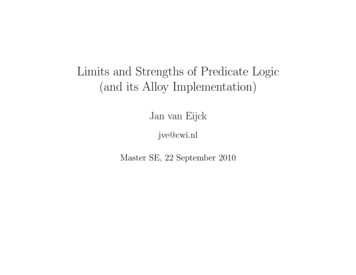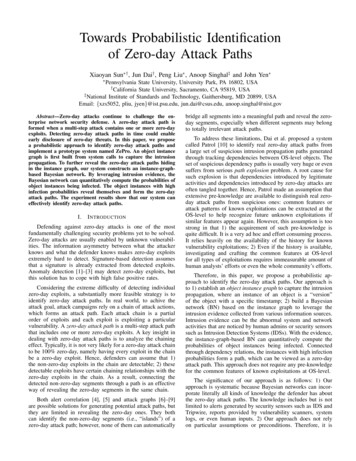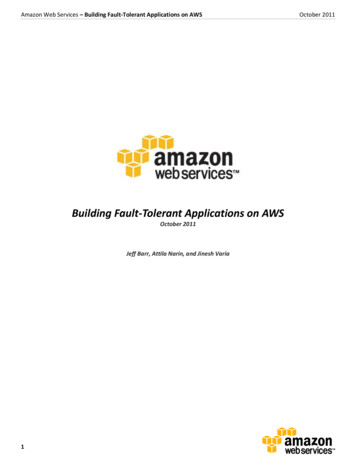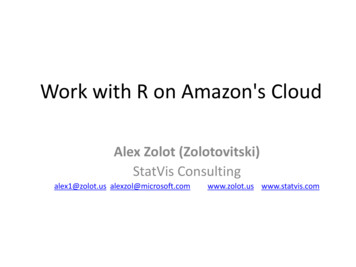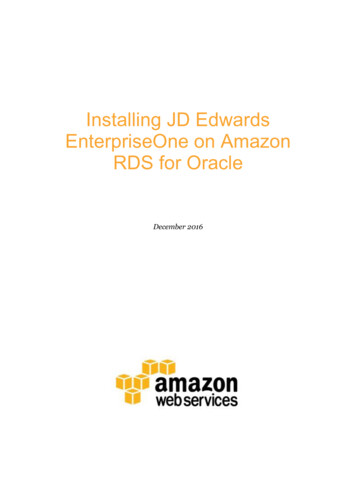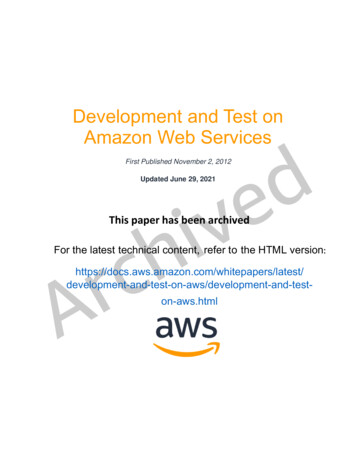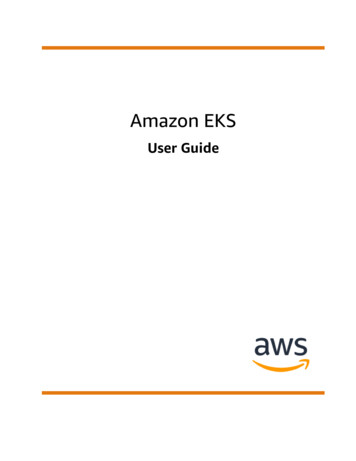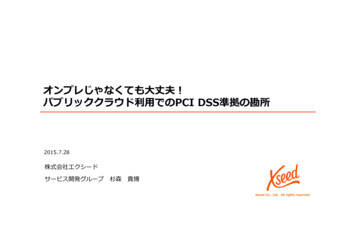
Transcription
Zero inON KNOWLEDGEReturn on Emotion:Predicting and Improving Human PerformanceWritten by Diana Durek and Wendy GordonF“A leader’s intelligence has to have a strong emotional component. Hehas to have high levels of self-awareness, maturity, and self-control. Shemust be able to withstand the heat, handle setbacks, and when those luckymoments arise, enjoy success with equal parts of joy and humility. No doubtEmotional Intelligence is more rare than book smarts, but my experiencesays it is actually more important in the making of a leader. You just can’tignore it.”- Jack Welch, former Chairman and CEO, General Electric Co.Emotional Intelligence Assessments and Solutionswww.mhs.com/ei
Return on EmotionZero inON KNOWLEDGEDiana Durek and Wendy GordonFigure 2: Top Performers Score Highest on EQ-iNeeds Development“Those who excelled in salesas well as meeting customers’needs clearly outperformedthose who did not,” says Durek.In fact, “one-half of the skillset that existing successfultelephone service centrereps need to be successful intheir new role is comprised ofemotional and social skills.”Effective FunctioningAssociates who scored high in both performance categories scoredsignificantly higher on the EQ-i as compared to those who only scored wellin one performance area, or were low in both. In other words, high emotionalintelligence was a strong predictor of associates with both required skill sets.The Business Case for Emotional IntelligenceCompanies often need proof that more effective leaders, teamwork, andcommunication contribute to the bottom line. The prospect of introducing EItools into an organization may generate some questions about the value of EIin the workplace.“You’re going to be asked, ‘How is this going to make the organization betterand how is this going to make us money?’” says Kelley Marko, President ofMarko Consulting Services. Marko suggests you always start by “lookingat the outcome that you want to achieve by engaging EI assessment anddevelopment in your organization. For example, having more effectiveleadership is often an outcome that organizations are looking for. Defining thisobjective—the ‘what’—gives a solid anchor point for participants. Emotionalintelligence training then provides the ‘how’ to achieve this outcome in astrategic and informed way.”Emotional Intelligence Assessments and Solutions www.mhs.com/eiCopyright 2006 Multi-Health Systems Inc. All rights reserved.8 of 14
Return on EmotionZero inON KNOWLEDGEResults of this studyagain demonstrate thatthose with higher EI scoresperformed better than thosewith lower EI scores.Various combinations ofcompetencies —in this case5 to 8 —can create acompetitive advantage.Diana Durek and Wendy GordonDurek reveals that outcomes of applying EI in the workplace can be quantifiedin dollar amounts:In a national insurance company, insurance sales agents weak in emotionalcompetencies such as self-confidence, initiative, and empathy sold policieswith an average premium of 54,000. Those who were strong in at least 5of 8 key emotional competencies sold policies worth 114,000. (Hay/McBerResearch and Innovation group, 1997).Figure 3: Salespeople with High EI Make Bigger Sales 114,000 54,000Agents Weaker in EIAgents Stronger in EIAmerican Express Financial Advisors’ sales increased 18% after attending anEmotional Competence Program. As a seperate study revealed, sales in regionswhere the managers attended the program increased 10% over sales wheresales managers did not attend the program. (Consortium for Research onEmotional Intelligence, n.d.)Recognizing that the higher one is in an organization, the more influence onehas on others, American Express prefers to offer training opportunities toleaders first. Imagine increasing your organization’s sales by 11% by training asingle manager in emotional intelligence competencies.EQ was used to evaluate which scores predict success for debt collectors. Starperformers collected 100% of quota while low performers collected 47%. Newrecruits who had been hired on the basis of their high scores and those whoreceived special training collected 163% of quota over 3 months. (Bachman,2000)Emotional Intelligence Assessments and Solutions www.mhs.com/eiCopyright 2006 Multi-Health Systems Inc. All rights reserved.9 of 14
Return on EmotionON KNOWLEDGEDiana Durek and Wendy GordonEImpr vingINew recruits hired for debt collection, tested for EI, and trained in EI skillsperformed even better than existing star performers who met 100% of theirquota. In other words, improving emotional intelligence can help raise the barfor an organization’s performance.oZero inIn the examples shown here, those who scored well on EI assessments vastlyoutperform their colleagues who do not.Likewise, those who participate in EI-based training demonstrated increasedproductivity. From the question and answer section that followed, it was clearthat webcast participants valued the bottom-line impact of EI and were eagerto discuss implementing training and development programs. Topics on EIdevelopment and coaching will certainly be a focus for future HCI EI web castsand white papers.four-step development process:1.Assess. Get feedback on what areas to improve.2.Demonstrate. What does the skill look like? Get specific, concreteexamples during training and coaching.3.Practice. Role-play these skills in practice and job-based scenarios.4.Feedback. Get an idea of how close you are getting to the ideal.“There is good evidence that improving leadership is best done by figuringout what strengths the leader has,” said Dr. Richard. People prefer increasingstrengths over weaknesses, “and evidence shows that there is a big payoff.”Emotional Intelligence Assessments and Solutions www.mhs.com/eiCopyright 2006 Multi-Health Systems Inc. All rights reserved.10 of 14
Zero inReturn on EmotionON KNOWLEDGEDiana Durek and Wendy GordonReferencesBachman, J. Stein, S.J., Campbell, K., & Sitarenios, G. (2000). EmotionalIntelligence in the Collection of Debt. International Journal of Selection andAssessment, 8, 176-182.Consortium for Research on Emotional Intelligence in Organizations. (n.d.).Emotional Competence Training - American Express Financial Advisors. RetrievedFeb 1, 2008 from http://www.eiconsortium.org/model programs/emotionalcompetence training.html.Handley, R. and Bar-On, R. (1998). ‘Military Recruiting: The Departmentof Defense Could Improve Its Recruiter Selection and Incentive Schemes’,Submission to Congress, U.S. Government Accounting Office, January 30.Hay/McBer Research and Innovation Group (1997). This research wasprovided to Daniel Goleman and is reported in his book (Goleman, 1998)Emotional Intelligence Assessments and Solutions www.mhs.com/eiCopyright 2006 Multi-Health Systems Inc. All rights reserved.11 of 14
Zero inReturn on EmotionON KNOWLEDGEDiana Durek and Wendy GordonPresenterDiana Durek, Consultant, Multi-Health SystemsDiana is an expert in the area of emotional intelligence and its bottom-lineimpact on selection, development, and leadership initiatives in organizationsacross a wide range of industries. During her 6 years with MHS, a leadingglobal psychological test publisher, she has worked closely with organizationsto develop star performer systems powered by an emotional intelligenceframework. Through comprehensive integration of star performer modelsinto selection and performance management systems, Diana has helpedorganizations increase revenue and save money by predicting and improvingindividual and organizational performance. She frequently presents atconferences that cover business, human resources, and psychology. Priorto joining MHS, she held clinical and research positions as a mental healthprofessional, providing a variety of services to children and adults.PanelistsCary Cherniss, Professor of Applied Psychology, Rutgers UniversityCary Cherniss received his Ph.D. in Psychology from Yale University in 1972.He went on to teach at the University of Michigan in Ann Arbor, the Universityof Illinois in Chicago, the Chicago Medical School, and the Illinois Instituteof Technology. In 1983, he came to Rutgers University where he helpedcreate the doctoral program in Organizational Psychology at the GraduateSchool of Applied and Professional Psychology. He currently is Professor ofApplied Psychology and Director of the Organizational Psychology program.Dr. Cherniss specializes in the areas of emotional intelligence, work stress,leadership development, and planned organizational change. He has publishedover 60 scholarly articles and book chapters on these topics, as well as sixbooks, including The Emotionally Intelligent Workplace (Jossey-Bass, withDaniel Goleman) and Promoting Emotional Intelligence in the Workplace:Guidelines for Practitioners (American Society for Training and Development,with Mitchel Adler). In addition to his research and writing, Dr. Cherniss hasconsulted with many organizations in both the public and private sectors,including American Express, Johnson & Johnson, the US Coast Guard,AT&T, Telcordia, the United States Office of Personnel Management, andPSEG Power. He currently is the director and co-chair of the Consortium forResearch on Emotional Intelligence in Organizations. He is a fellow of theAmerican Psychological Association, past president of its Division 27 (Societyfor Community Research and Action), and a member of the Academy ofManagement.Emotional Intelligence Assessments and Solutions www.mhs.com/eiCopyright 2006 Multi-Health Systems Inc. All rights reserved.12 of 14
Zero inReturn on EmotionON KNOWLEDGEDiana Durek and Wendy GordonKelley Marko, President, Marko Consulting Services, Inc.Kelley is President of Marko Consulting Services Inc., a leading Canadianfirm working with organizations worldwide in developing high-performanceleaders and enabling sustainable and meaningful change. In all his work,Kelley’s ultimate focus is to move individuals and organizations to strategicand informed action that impacts the bottom line. Kelley is also a professionalexecutive coach and a certified adult educator. He is a master trainer andcoach of emotional intelligence (EQ) and has worked with hundreds ofleaders across diverse industries to improve their leadership competencies.His background incorporates front line through senior leadership positionsin industry and professional management consulting with McKinsey andPriceWaterhouseCoopers in the area of organization and change strategy.Kelley holds an MBA from York University, an MA in Leadership and Learningfrom Royal Roads University and delivers a program called “Developing EQin Your Workplace” through the Schulich Executive Education Centre, YorkUniversity and Texas A&M University.Larry Richard, Vice President, Hildebrandt InternationalDr. Richard is the head of the Leadership & Organization Development PracticeGroup, which helps law firms and legal departments on people issues. Sincethe early 1980’s, he has pioneered the application of psychology and otherbehavioral sciences to the improvement of leadership and managementpractices in the legal profession. Dr. Richard is recognized as the leadingauthority on leadership effectiveness and organizational behavior in law firms.He is also a leading expert on lawyers’ personalities. During his career, he hasdeveloped numerous innovations to help the leaders in large law firms acquireand retain talent, develop that talent, and motivate people. Over the past20 years, Dr. Richard has worked with hundreds of law firms and corporatelaw departments to improve human performance in ways that improve thebottom line, increase satisfaction, and promote teamwork. Prior to becoming aconsultant, he was a trial lawyer for ten years in Pennsylvania and New York.Dick Thompson, President and CEO, High Performing SystemsHenry L. (Dick) Thompson, Ph.D., is president & CEO of High PerformingSystems, Inc. (HPS), an international management consulting and training firmhe founded in 1984. Throughout his career, he has gained valuable experience,insights and expertise building and leading high performing teams-from thebattlefield to the boardroom-using a systems approach.Emotional Intelligence Assessments and Solutions www.mhs.com/eiCopyright 2006 Multi-Health Systems Inc. All rights reserved.13 of 14
Zero inON KNOWLEDGEReturn on EmotionDiana Durek and Wendy GordonDr. Thompson conducts research in areas that include Leadership, EmotionalIntelligence, Cognitive Ability, Psychological Type (personality) and GroupDynamics (FIRO theory), and is recognized as a leading authority on assessingand integrating these concepts. He is a certifying/qualifying instructor forthe Bar-On EQ-i, (Emotional Quotient Inventory), the MBTI instrument andElement B. His leading-edge work on selecting leaders, incorporating conceptssuch as Emotional Intelligence, has resulted in the Leadership PotentialAssessment System, a unique scientific process for identifying best-fit leadersand determining their potential for growth across time.oModerat rJoy Kosta, Director, HCI Communities, the Human Capital Institutesuth roAAs Director of Talent Development and Leadership Communities at TheHuman Capital Institute, Joy brings twenty-five years of experience inmultiple facets of organizational development, human resources andbusiness management with an emphasis in customer satisfaction, servicequality, process improvement, and applying the Malcolm Baldrige Criteria forPerformance Excellence. As founder and President of Performance Partners inHealth Care, a company dedicated to building better patient experiences, shehas authored several curriculums in leadership and staff development, and coauthored with Harold Bursztajn, MD Senior Clinical Faculty member, HarvardMedical School, Building a Treatment Alliance with Patients and Families.Diana Durek, Senior EI Advisor, MHS Inc.Wendy Gordon, Senior Information Developer, MHS Inc.Emotional Intelligence Assessments and SolutionsU.S.P.O. Box 950North Tonawanda, NY14120-0950Phone: 1-800-456-3003International39A KingfishercourtHambridge RoadNewbury, BerkshirePhone: 1-416-492-2627Fax: 1-888-540-4484 or 1-416-492-3343www.mhs.com/eiCanada3770 Victoria Park Ave.Toronto, OnM2H 3M6Phone: 1-800-268-6011
Star performers collected 100% of quota while low performers collected 47%. New . and a member of the Academy of Management. 12 of 14. . he was a trial lawyer for ten years in Pennsylvania and New York. Dick Thompson, President and CEO, High Performing Systems Henry L. (Dick) Thompson, Ph.D., is president & CEO of High Performing .
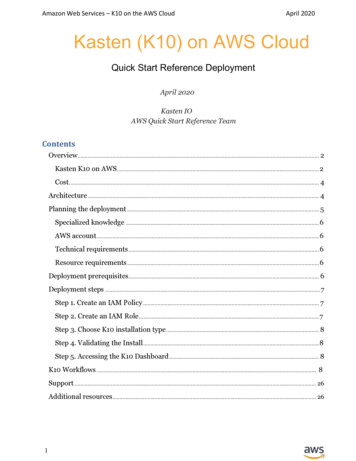
![Index [beckassets.blob.core.windows ]](/img/66/30639857-1119689333-14.jpg)
